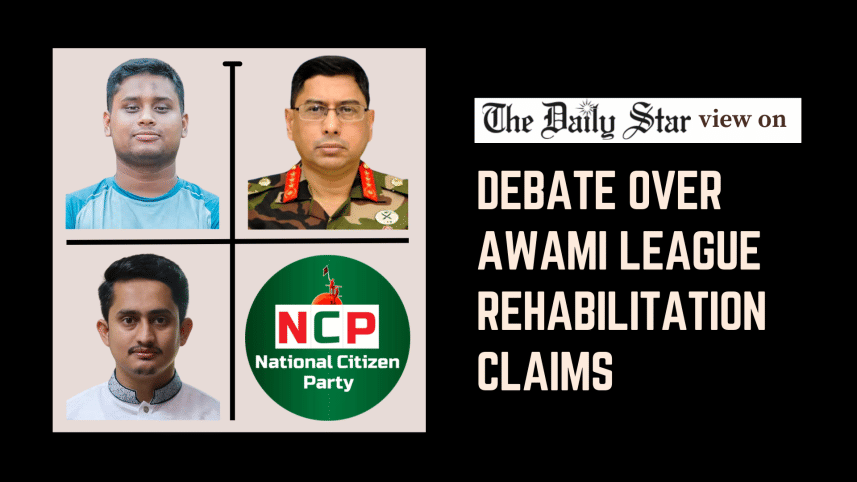Questions over Awami League’s future must not lead to fresh chaos

Ever since the July uprising, the nation has been rocked by wave after wave of protests, both online and offline, over various issues and developments. While this is but a natural consequence of the heightened exposure to, and awareness of, long-festering injustices and divisions, the recent flare-up over the question of Awami League's rehabilitation following alleged exchanges between some leaders of the National Citizen Party (NCP) and the army chief has the potential to plunge the country into fresh chaos, if not properly addressed. The explosiveness of the situation owes as much to the alleged content of said exchanges, and the manner in which they were revealed, as to the sway involved parties hold over the post-uprising society.
On the assumption that these developments are known to all, we are not delving into details. To sum up, in a Facebook post on Friday, NCP leader Hasnat Abdullah claimed that he had been presented with an "Indian plan" at the cantonment to rehabilitate Awami League. It involves a "refined" version of the party, led by leaders without questionable reputations, which would publicly renounce Sheikh Hasina's legacy and pledge to restore the ideals of "Bangabandhu's Awami League." In exchange, Hasnat wrote, politicians who endorse this new faction would receive parliamentary seats and other concessions. The justification for the move, he added, was that "it is better to have several opposition parties, including a weak Awami League, than just one party in opposition."
After the post went viral, it prompted heated debate and demonstrations. Later, the veracity of Hasnat's version of the event was contested by his NCP colleague Sarjis Alam, who accompanied him during the meeting with army chief General Waqar-uz-Zaman, while another, Nasiruddin Patwary, called the post "inappropriate". Meanwhile, the army called it "laughable" and "immature" in a statement shared with the Netra News. However, what's clear from these statements is that a meeting did take place, whether pre-planned or not, and Awami League's rehabilitation did get a mention, even if its intent and other relevant details remain disputed.
After the post went viral, it prompted heated debate and demonstrations. Later, the veracity of Hasnat's version of the event was contested by his NCP colleague Sarjis Alam, who accompanied him during the meeting with army chief General Waqar-uz-Zaman, while another, Nasiruddin Patwary, called the post "inappropriate". Meanwhile, the army called it "laughable" and "immature" in a statement shared with the Netra News. However, what's clear from these statements is that a meeting did take place, whether pre-planned or not, and Awami League's rehabilitation did get a mention, even if its intent and other relevant details remain disputed. This development brings to the fore the critical importance of transparency in any process involving the future of Awami League to prevent confusion, foul play, or political exploitation. It also reaffirms the need for Sheikh Hasina and other leaders to be held accountable for the atrocities they committed. The longer this takes, the greater the risk of chaos.
We need to keep in mind that people are still grappling with the consequences of the authoritarian rule of the ousted regime that has left deep scars in society. The last thing we need now is further instability. We agree with the NCP that political decisions should be left to the political entities. But the need for broader consensus in such matters cannot be ruled out either. At the same time, we must be careful that the army is not pulled into any matters that do not concern it. The chief adviser has already said that the interim government had no plan to ban the AL—that doesn't mean AL's future is decided. As the trial process for its crimes continues, politicians may, and should, continue to engage in discussions about it but this must not lead to further turmoil. All stakeholders of the July uprising must act with greater caution and restraint.



 For all latest news, follow The Daily Star's Google News channel.
For all latest news, follow The Daily Star's Google News channel.
Comments